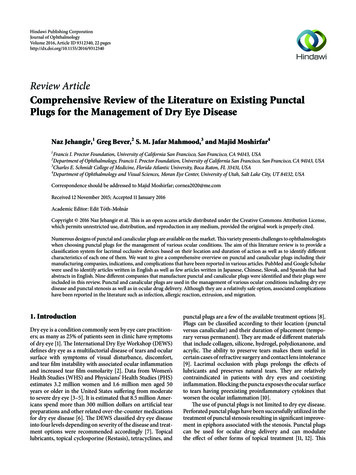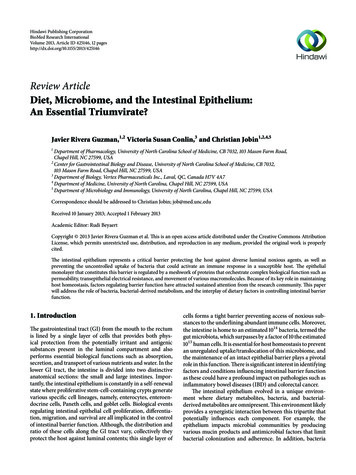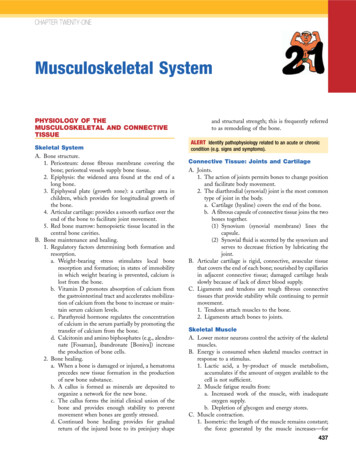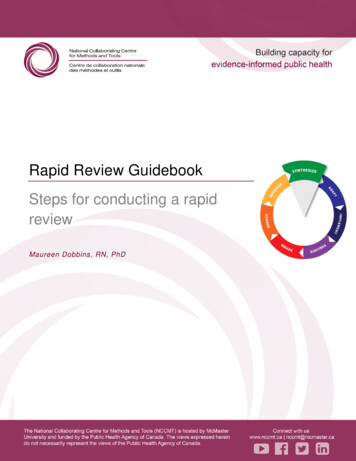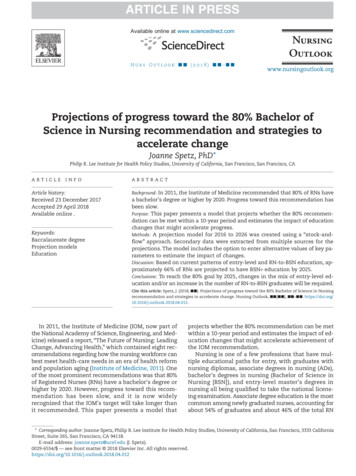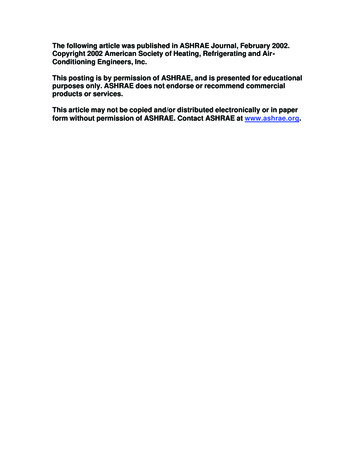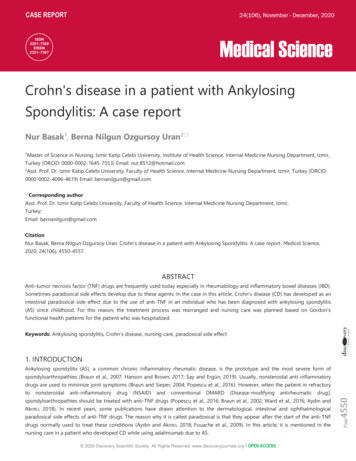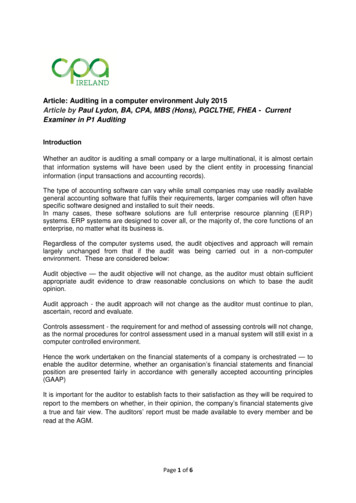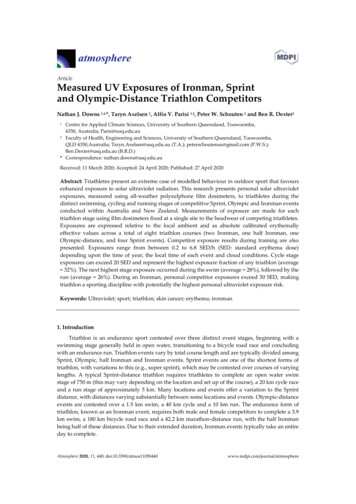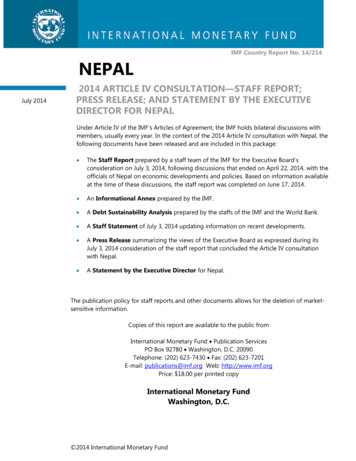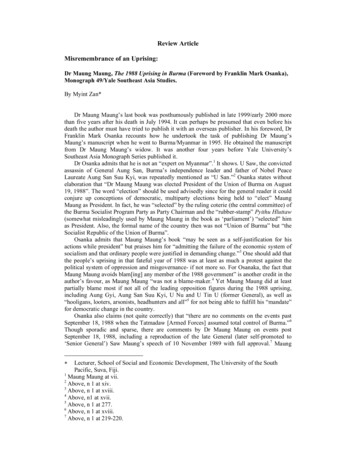
Transcription
Review ArticleMisremembrance of an Uprising:Dr Maung Maung, The 1988 Uprising in Burma (Foreword by Franklin Mark Osanka),Monograph 49/Yale Southeast Asia Studies.By Myint Zan*Dr Maung Maung’s last book was posthumously published in late 1999/early 2000 morethan five years after his death in July 1994. It can perhaps be presumed that even before hisdeath the author must have tried to publish it with an overseas publisher. In his foreword, DrFranklin Mark Osanka recounts how he undertook the task of publishing Dr Maung’sMaung’s manuscript when he went to Burma/Myanmar in 1995. He obtained the manuscriptfrom Dr Maung Maung’s widow. It was another four years before Yale University’sSoutheast Asia Monograph Series published it.Dr Osanka admits that he is not an “expert on Myanmar”.1 It shows. U Saw, the convictedassassin of General Aung San, Burma’s independence leader and father of Nobel PeaceLaureate Aung San Suu Kyi, was repeatedly mentioned as “U San.”2 Osanka states withoutelaboration that “Dr Maung Maung was elected President of the Union of Burma on August19, 1988”. The word “election” should be used advisedly since for the general reader it couldconjure up conceptions of democratic, multiparty elections being held to “elect” MaungMaung as President. In fact, he was “selected” by the ruling coterie (the central committee) ofthe Burma Socialist Program Party as Party Chairman and the “rubber-stamp” Pyithu Hluttaw(somewhat misleadingly used by Maung Maung in the book as ‘parliament’) “selected” himas President. Also, the formal name of the country then was not “Union of Burma” but “theSocialist Republic of the Union of Burma”.Osanka admits that Maung Maung’s book “may be seen as a self-justification for hisactions while president” but praises him for “admitting the failure of the economic system ofsocialism and that ordinary people were justified in demanding change.”3 One should add thatthe people’s uprising in that fateful year of 1988 was at least as much a protest against thepolitical system of oppression and misgovernance- if not more so. For Osanaka, the fact thatMaung Maung avoids blam[ing] any member of the 1988 government” is another credit in theauthor’s favour, as Maung Maung “was not a blame-maker.4 Yet Maung Maung did at leastpartially blame most if not all of the leading opposition figures during the 1988 uprising,including Aung Gyi, Aung San Suu Kyi, U Nu and U Tin U (former General), as well as“hooligans, looters, arsonists, headhunters and all”5 for not being able to fulfill his “mandate”for democratic change in the country.Osanka also claims (not quite correctly) that “there are no comments on the events pastSeptember 18, 1988 when the Tatmadaw [Armed Forces] assumed total control of Burma.”6Though sporadic and sparse, there are comments by Dr Maung Maung on events postSeptember 18, 1988, including a reproduction of the late General (later self-promoted to‘Senior General’) Saw Maung’s speech of 10 November 1989 with full approval.7 Maung Lecturer, School of Social and Economic Development, The University of the SouthPacific, Suva, Fiji.1Maung Maung at vii.2Above, n 1 at xiv.3Above, n 1 at xviii.4Above, n1 at xvii.5Above, n 1 at 277.6Above, n 1 at xviii.7Above, n 1 at 219-220.
Maung also expressed his approval of the election commission's disqualification of Aung SanSuu Kyi's nomination in the 1990 elections.8 Maung Maung even made a sarcastic, if notalmost sneering, comment on the 1991 Nobel Peace Prize that was awarded to Aung San SuuKyi.9In the “Introduction”, as indeed in quite a few parts of the book, Dr Maung Maung triedto sound “philosophical” and wrote almost romantically about “change” and how “1988 wasthe year of change in Myanmar”. At this juncture one recalls that in a similar ‘affecting’fashion he wrote about change and impermanence in his 1969 book Burma and General NeWin and how the General’s accession to power (ever so reluctantly on General Ne Win’s partaccording to Maung Maung) was part of the process of change or Anicca- a theme he repeatedin this book.10He stated that during the 1988 crisis in Burma he helped “bring about the change” andwas himself “part of the change” and that there are “already many excited accounts and hastyanalyses”. 11 However this reviewer is aware of only one other full-length book in the Englishlanguage that deals with the 1988 uprising, and that is Bertil Lintner’s Outrage first publishedaround 1989. Since Maung Maung made some critical, even unsavoury comments onLintner’s book,12 one wonders whether Maung Maung regarded Outrage not only as “excitedand hasty” but even as an outrageous account of that “brief, hectic, unique period inMyanmar”. He averred that his account “must also be a limited and subjective account.”13While the author’s “humility” is appreciated, his lack of objectivity and his obfuscationcan be found, among others, in his legalistic and fastidious (in the uncomplimentary sense ofthe words) description, defence and deference of the 1974 Burmese Constitution whichlegalised and ‘constitutionalised’ one-Party rule. In the "Introduction", and throughout hisbook, Maung Maung repeatedly referred to the 1974 Constitution not only in defence of hisactions during his presidency, but also in denigrating the opposition’s aspiration fordemocracy- especially their demand for an interim government which would supervise multiparty elections. When the 1947 liberal Constitution (in contrast to the 1974 one-PartyConstitution) was in force, Maung Maung wrote and published a treatise entitled Burma’sConstitution14 wherein he gave fulsome praise to the 1947 Charter. Nowhere in this book norin any of his writings did Maung Maung deem it fit to mention that the 1962 military coupwhich brought General Ne Win into power (indeed it was General Ne Win who successfullyinitiated the coup) was in direct violation of the 1947 Constitution.15 Instead, Maung Maungpraised the 1962 coup. Yet, in the pre 1962 days, he published an entire book and many otherwritings praising the 1947 Charter. Additionally, Maung Maung did not elaborate on thenature of the “referendum” that was held in December 1973 to adopt the one-Party (1974)8Above, n 1 at 275.Above, n 1 at 274.10Above, n 1 at 29.11Above, n 1 at 5.12Above, n 1 at pp. 173-74, 205.13Above, n 1 at pp 5-6.14Maung Maung, Burma’s Constitution, (Martinus Nijhoff, The Hague, 1959, Revised edition1961).15A jurisprudential analysis as to whether the coup was ‘illegal’ in a generic sense will not bediscussed here beyond saying that in this reviewer’s opinion due to the complete success ofthe coup it was ‘legal’ based on grounds of effectiveness. Unlike other Asian countries whichpartially share the common law legal system and where the validity of the laws issued by a‘revolutionary regime’ has been challenged (See, for example, The State v Dosso (1958) 2Pakistan Supreme Court Report, 180) there never was any legal - that is by litigation in thecourts - challenge of the Revolutionary Council and Revolutionary Government nor of itslaws. However this does not detract from the fact that at the very least since a militarytakeover was nowhere provided in the 1947 Constitution, the 1962 coup was in violation ofthe Constitution. (The English text of the 1947 Constitution can be found in Maung Maung’sBurma’s Constitution, above note 14).9
Constitution. The choice given to the voters in the 1973 referendum was not at all a choice inany meaningful sense of the word. If the voters had said “no” to the draft Constitution, theruling Revolutionary Council would have continued to rule by military decree. If they hadsaid “yes” to the draft Constitution the Revolutionary Council would have transferred powerto the Pyithu Hluttaw (a unicameral Legislature), which would then be “elected. In eachconstituency there would only be one candidate from the ruling Burma Socialist ProgrammeParty (BSPP). Article 11 of the 1974 Constitution stated that:“The State shall adopt a single Party system. The Burma Socialist Programme Party isthe single Party and it shall lead the State.”16The Chairman of both the Revolutionary Council and the Burma Socialist Programme Partywas U Ne Win. After the adoption of the 1974 Constitution, U Ne Win became the Presidentof the Socialist Republic of the Union of Burma and retained Chairmanship of the BSPP untilhis resignation in July 1988.17Moreover, the 1988 military takeover was also carried out in violation of the 1974 oneParty Constitution. Nowhere in the 1974 Constitution was it mentioned that the Army couldtakeover power. Hence, the military coups of both 1962 and 1974 were in violations of theBasic Laws in force during those times.18 Yet Maung Maung in this book praised bothmilitary coups. At the same time, and inconsistently, he was a great "constitutionalist" in thathe found the opposition’s demand for an interim government during the 1988 crisis to bepreposterous, a constitutional impossibility so to speak and therefore he was unable to accedeto since he was a “creature” of the Constitution19 and doing so would do “fatal violence to the[1974] Constitution.”20 Yet he has nothing but praise for the military coups of 1962 and 1988which had done fatal violence to the existing Charters.Even though Maung Maung wrote that the “the Constitution of 1947 had been nullifiedby the military coup of 1962”, he had found it expedient to quote from it, and regarded it as ayardstick by which to judge the legality or legitimacy of acts or events which occurred longafter the 1947 Constitution became defunct. Maung Maung referred to the 1947 Constitutionat the very end of the book in endorsing the election commission’s refusal to allow Aung SanSuu Kyi to stand as a candidate in the 1990 general elections.2116The English version of the 1974 Constitution can be found in Blaustein and Flanz,Constitutions of the World, New York: Oceana publications, 1990. By 1990, as a result of the1988 military coup, the 1974 (one-Party) Constitution was no longer in force.17The reviewer has written more extensively on the adoption of the 1974 Constitution andsome of the provisions of the 1974 Constitution - at times in comparison with its 1947predecessor. See Myint Zan, “Law and Legal Culture, Constitutions and Constitutionalism inBurma” in Alice Tay (Ed) East Asia: Human Rights, Nation-building, Trade (Baden-Baden:Nomos Publications, 1999) at 181, 236-51.18The current Burmese military government apparently has learned the “lesson” or at the leasthas tried to avoid ‘unconstitutional’ military coups in the future. Principle 29 of the “BasicPrinciples, The principles laid down to serve as bases in prescribing State FundamentalPrinciples adopted by the National Convention” in the booklet The Basic Principles andDetailed Basic Principles laid down by the National Convention Plenary Sessions up to 30March 1996 states that “when there arises a state of emergency that could cause disintegrationof the Union, disintegration of national solidarity, and loss of national sovereignty, due totakeover of sovereign State power or attempts therefor [sic for thereof] by wrongful forciblemeans such as insurgency or violence, the Defence Services Commander-in-Chief has theright to takeover and exercise State power in accord [sic] with provisions of StateConstitution”.19Above, n 1 at 7.20Above, n 1 at 204.21Above, n 1 at 276.
Dr Maung Maung, the learned legal scholar with doctoral degrees from Utrecht and YaleUniversities, gave a short discourse on comparative constitutional law when he wrote thateven though the popularity of an American president may dip to “as low as 10% or 20% hedoes not, cannot resign until his term is over.”22 Perhaps Dr Maung Maung shouldrefamilarise himself with Richard Nixon’s resignation from the United States presidency inAugust 1974. In another part of the book, Dr Maung Maung continued the comparison of hispresidency with those of the United States. When US Congressmen Stephen Solarz visitedPresident Maung Maung during his presidency, the Burmese president jokingly referred to theUS Congressman about Solarz’s presidential ambitions. Solarz replied that he would invite DrMaung Maung to lunch if “he made it to the White House” and if Dr Maung Maung“happened to be in Washington”. Dr Maung Maung wrote:“I replied that if I came to lunch and found demonstrators out in the streets or on hislawn, I would advise him to resign and hand over to an interim government. He did notfind that funny.”23Neither does this reviewer. To equate the 1988 people’s uprising in Burma which spread toover forty cities and towns throughout the country, where hundreds of thousands of peoplefrom many walks of life demonstrated daily for about forty days against the BSPP regime, asa moral equivalent so to speak of almost run of the mill demonstrations outside the WhiteHouse is at best tendentious and at worst almost puerile.Maung Maung’s comparison between the United States and Burma is not restricted to thesystem of governance and Constitutions, but apparently extended to personalities such as theauthor himself and a particularly famous and respected American president. To be precise, thelearned author stated (at least obliquely) that he was trying to emulate Abraham Lincoln,when he quoted from this US President and inferred that he, like Abraham Lincoln, had done“the very best I know how, the very best I can.”24 The reviewer’s opinion is that MaungMaung’s role could more profitably be contrasted, rather than compared with that of anothertransitional figure from another oppressive regime: that of the role of former President DeClerk of South Africa who, together with Nelson Mandela, helped bring about the end ofapartheid. The author inferred that but for the exploitative, power-hungry opposition leaders,the mobs in the streets, “the opportunists, the brazen-faced bandwagon climbers”25 he couldhave achieved his mandate of bringing democratic change in Burma. Dr Maung Maung wrotethat if
When the 1947 liberal Constitution (in contrast to the 1974 one-Party Constitution) was in force, Maung Maung wrote and published a treatise entitled Burma’s Constitution14 wherein he gave fulsome praise to the 1947 Charter. Nowhere in this book nor in any of his writings did Maung Maung deem it fit to mention that the 1962 military coup which brought General Ne Win into power (indeed it was .
